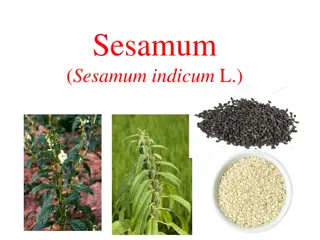Sesame Seed
Sesame seeds, rich in protein, vitamins, minerals, and antioxidants, have been used in folk medicine for centuries. They offer various health benefits, including lowering cholesterol, supporting bone health, and aiding blood cell formation. Discover the nutritional components, properties, and potential health perks of sesame seeds in this informative guide.
Download Presentation

Please find below an Image/Link to download the presentation.
The content on the website is provided AS IS for your information and personal use only. It may not be sold, licensed, or shared on other websites without obtaining consent from the author.If you encounter any issues during the download, it is possible that the publisher has removed the file from their server.
You are allowed to download the files provided on this website for personal or commercial use, subject to the condition that they are used lawfully. All files are the property of their respective owners.
The content on the website is provided AS IS for your information and personal use only. It may not be sold, licensed, or shared on other websites without obtaining consent from the author.
E N D
Presentation Transcript
Salahaddin University - Erbil College of Education - Biology Department Sesame Seed Zahra Suleiman Muhammed
Sesame Seed Sesame (Sesamum indicum L.), often known as Til, is a flowering plant in the Sesamum genus. Sesame seeds are tiny, oil-rich seeds that grow in pods. They have been used in folk medicine for thousands of years. Sesame seeds can be found in a number of different colors, including brown, red, black, yellow and ivory. It is native tropical areas in Asia, Africa and South America.
Properties of Sesame Seeds: Sesame seeds are rich in protein, vitamins, minerals and antioxidants. commonly added to certain foods to provide a nutty flavor and crunchy texture. They are Sesame seeds are also used as an ingredient in soap, cosmetic and lubricants. It is widely utilized for medicinal applications due to the presence of some unique phytochemicals.
Nutritional Components Sesame seeds/100 gm Total Fat 50 g Saturated fat 7 g Nutritional Value of Sesame Seed Copper 2.29 mg Total Carbohydrate 23 g Sesame seeds are a good source of several nutrients that are important for many potential , including zinc, selenium, copper, iron, vitamin B, and vitamin E. Sesame oil is most widely utilized in bakeries. Protein, vitamin B1, dietary fiber, phosphorus and iron. Dietary fibre 12 g Calcium 1450 mg health benefits Protein 18 g Sodium 11 mg Potassium 468 mg Iron 9.3 mg Zinc 12.20 mg Magnesium 87% Vitamin B6 Total Fat 40% 50 g
01 Health Benefits of Sesame Seeds Good Source of Fiber 02 May Lower Cholesterol and Triglycerides 03 . May Help Lower Blood Pressure 04 . May Support Healthy Bones 05 May Support Your Immune System
06 It may show blood sugar lowering activity 07 It may show Anti-cancer properties 08 It might have liver protective activity . 09 May Reduce Inflammation . 10 May Aid Blood Cell Formation
How to Use Sesame Seeds? Sesame seeds are available in six different forms: Sesame seeds Sesame milk Sesame seed oil Sesame seed capsule Sesame seed powder Sesame seed paste You must consult a qualified doctor before taking sesame seeds or any herbal supplements. Do not discontinue or replace an ongoing treatment of modern medicine with an ayurvedic/herbal preparation without consulting a qualified doctor.
How Much Sesame Seeds Can I Eat Daily: 1 . Eat 1/2- 1 tablespoon or as per your taste roasted Sesame seeds in a day. 2. Or, you can also add Sesame seeds to salads as per your taste to get relief from constipation.
References Manosroi, A., Chaikul, P., Chankhampan, C., Ruksiriwanich, W., Manosroi, W. and Manosroi, J., 2018. 5 - reductase inhibition and melanogenesis induction of the selected Thai plant extracts. Chiang Mai J. Sci, 45, pp.220-236. Namiki, M., 2007. Nutraceutical functions of sesame: a review. Critical reviews in food science and nutrition, 47(7), pp.651-673. Ogasawara, T., 1988. k. Chiba, m. Tada in (YPS Bajaj ed). Medicinal and Aromatic Plants. Pathak, N., Rai, A.K., Kumari, R. and Bhat, K.V., 2014. Value addition in sesame: A perspective on bioactive components for enhancing utility and profitability. Pharmacognosy reviews, 8(16), p.147. Yadav, N.V., Sadashivaiah, Ramaiyan, B., Acharya, P., Belur, L. and Talahalli, R.R., 2016. Sesame oil and rice bran oil ameliorates adjuvant-induced arthritis in rats: distinguishing the role of minor components and fatty acids. Lipids, 51, pp.1385-1395.























